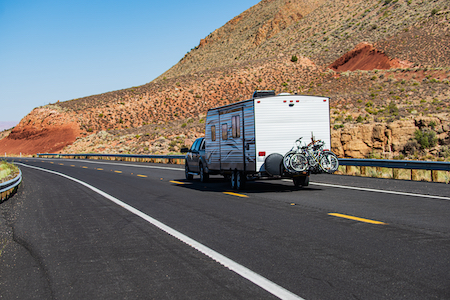Ah, the joys of summer. You’ve bought all the toys, and love heading into the mountains for a weekend of fun. But towing trailers, boats, and other utility items can take its toll on fuel efficiency.
You’ve experienced low fuel efficiency repeatedly while towing. What can you do?
With gas prices inching ever upward, fuel efficiency is something you think about more than ever. If it’s making you think twice about taking a few days away from city life, there are a few things you can do.
Understanding fuel economy
When you think about fuel economy, it comes down to understanding what pushes your vehicle to move harder. The more pressure it has while moving itself and what you’re towing, the more fuel it will use.
If your goal is to improve fuel economy while towing, you need to take action where it makes the biggest difference.
The biggest factor is weight. It takes more energy to accelerate and decelerate every time you start, stop, or move the combined vehicle up the road. This is where it pays to take a second look at the items you are bringing. Are there things that rarely get used? Are there things you can lighten up?
The second biggest impactor is aerodynamics. This is how the wind is affected as the combined vehicle/trailer moves through the air. If you change the way your vehicle is shaped, it can have an impact on efficiency.
Of course, more minor issues can impact overall efficiency too.

Tires – are tires on the vehicle and trailer in good working condition? Proper inflation and tire pressure helps keep the vehicle properly connected to the road.
Brakes – if a brake drags while you’re driving, it adds resistance to the drive, and reduces fuel efficiency.
Trailer stability – no matter how well your vehicle is maintained, if the item you are towing is wobbly and not fully operational, it will impact your drive, and ultimately, your efficiency.
What can you do to increase fuel efficiency while towing?
Before you head out on the open road for time away from the normal routine, spending a few minutes thinking about efficiency can make all the difference. The best place to start is with the things you can control.
Vehicle weight – what you’re carrying takes up space. The heavier your combined vehicle is, the more energy it will take to get it where you’re going. Weight affects energy. So to improve fuel economy, if you take only what you need, there will be less to tow. Are there ways to condense the items you’re bringing? That means less pressure every time you start and stop.
Aerodynamics – this is where engineering comes into play. Have you noticed how semi-trucks are changing? They create more aerodynamics to make the driving process more efficient. You can do the same with the load you are carrying. You can do this by the size of the load you’re carrying, as well as by focusing on the amount of drag you have on the load. Do you have luggage racks, bicycles, and other personal items attached to the vehicle in various places? Do you have streamlined lines, or is it more random? There is a lot of turbulence around the trailer as you drive. If you can make the structure more aerodynamic, you’ll notice a difference in the fuel usage.
Plan your route – when you have a big load, the shortest distance between two points isn’t necessarily the best route. Instead, focus on the drive itself. Can you avoid high-traffic zones, where you’ll idle and waste fuel? Can you avoid high wind areas where you’ll increase resistance throughout the drive, possibly putting your vehicle in harm’s way? Not every obstruction is avoidable. But with a little foresight, sometimes you can find better ways to arrive at your final destination.
Slow down – just because a speed limit is posted doesn’t mean you have to abide by it. Most American vehicles reach peak efficiency somewhere between 50 and 60 miles. Pushing your vehicle faster will make you lose efficiency the faster you drive. Yes, you might not arrive at your final destination quite as fast as anticipated. This might give you an opportunity to stop sooner in more unique places. Where else can you stop along your route?
Keep up with maintenance – this includes your vehicle and what you tow. Letting even one thing slide can impact the drivability of your vehicle, which in turn affects your fuel economy. This includes the obvious things like changing your oil and fixing any mechanical parts that may need replacing. Pay attention to the tires, and replace them early before you risk damage while on the road. This can be especially true if you haven’t had your trailer on the road in months. Ensure everything is in good working condition, well-lubricated, and firmly attached to your vehicles for lower wind resistance.
Drive less – planning is everything, both before and during your trip. Combine errands whenever possible. Think twice about driving longer distances – is there someplace closer you can go? Instead of heading out several weekends to different parts of the surrounding area, what if you combined it into one long vacation? Not only is this a fuel efficient thing to do, but it also helps you relax more without the added stress of longer drive times and less stress.
Towing doesn’t have to ruin fuel efficiency
In fact, if you pay attention to the tips above, you might be surprised at how more efficient you make your vehicle, and how much more you enjoy your time away.
Towing a vehicle is never easy. But with a little forethought, you can improve the efficiency with and without the trailer too.
Wherever you’re going, whatever the driving conditions, you’ll see your mileage increase with just a few simple tips. And that’s more money you can take with you and enjoy on your vacations away from everything.
